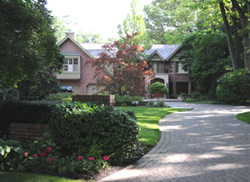How to price your home? If you sell your home through an experienced agent, the agent will use several methods (comparison approach, income approach or cost approach) to help you figure out how much your home is worth. However, in any cases, the price of a property is governed by several basic factors. These factors are categorized below for discussion purposes, but in fact, they are correlated in the marketplace.
Location: The most important factor in the value of a home is its location. Although a good location is subjective, common indicators of a good location include nice, safe, and quiet streets, good schools, and proximity to public transit, supermarkets, banks, libraries and shopping malls in the area.
Supply and Demand: If the supply increases but the demand remains constant, the price will decrease. If the demand increases but the supply remains constant, the price will increase. If both supply and demand increase or decrease proportionately, price will remain relatively stable.
Competition: If there are a lot of homes similar to yours available, the price of your home may be decreased as a result of competition.
Neighbourhood: The neighbourhood has impact on the property. For example, the value of a big and new house will decrease if it is surrounded by small and old houses. On the contrary, the value of a small and old house will increase if it is surrounded by big and new houses.
Contribution: Any improvement to a property is worth only what it adds to the property’s market value, regardless of the improvement’s actual cost. For example, if you build an additional bathroom to a three bedroom house with four bathrooms, it will not increase the value of the property significantly compared to the money you put in.
Configuration: Regardless of the square footage of the house, the configuration of rooms is important for resale value. For example, inadequate bathroom facilities could negatively impact the value of the property.
Consistent Use: The values of the house and land have to be evaluated on the same level. For example, if your property is located in a mixed residential and commercial zone, you cannot price the house as residential, while setting price of the land based on commercial value in order to have a better price in total. If the buyer buys the property for commercial purposes, the house may lose its value and need to be re-built to fit that purpose. If the buyer buys the property for living, the commercial benefit of the land is overshadowed. In general, in this case, you must evaluate the house and its land on the same level, either residential, or commercial.
External Factors: The home price is affected by external factors. Factors that change economically or socially can impact the value of the home significantly. For example, most people living in ABC City work for XYZ Company. If the company decides to move the plant to Mexico, the value of a home in the city will likely be decreased. On the contrary, if the company decides to expand the plant and hire two or three times more the number of the current employees, then the value of a home in the city will be likely in the increasing trend. Other factors include bank interest, immigration law, unemployment rates, birth rate are also have impact on the value of a home.
.png)